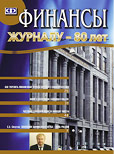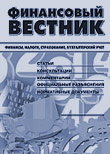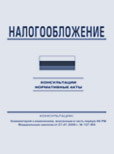Содержание
АКТУАЛЬНО
А.Ю. Демидов, заместитель руководителя Казначейства России, профессор кафедры и практики государственного контроля Института государственной службы и управления РАНХиГС, заслуженный экономист Российской Федерации, доктор экономических наук
E-mail: finance-journal@mail.ru
Казначейское сопровождение официально применяется с 2016 г., а его отдельные положения применялись еще в 2015 г. За это время пройден непростой путь применения, осмысления и совершенствования этого инструмента. Однако дискуссия относительно целесообразности использования данного инструмента все еще продолжается.
В статье приводятся причины и обстоятельства, которые потребовали разработки казначейского сопровождения, отражены особенности реализованных нормативно-правовых и технологических решений при выполнении бизнес-процессов казначейского сопровождения, а также направления дальнейшего его совершенствования.
Ключевые слова: казначейское сопровождение, Бюджетный кодекс РФ, подсистема управления расходами при казначейском сопровождении, расширенное казначейское сопровождение, «единый» лицевой счет участника казначейского сопровождения, цифровое казначейское сопровождение.
ФИНАНСЫ И БЮДЖЕТ: ПРОБЛЕМЫ И РЕШЕНИЯ
С.Н. Калюгина, заведующая кафедрой государственного и муниципального управления и экономики труда Северо-Кавказского федерального университета (г. Ставрополь), доктор экономических наук, профессор
E-mail: skaliugina@ncfu.ru
С.В. Зенченко, директор Департамента развития и маркетинга, профессор кафедры финансов и кредита Северо-Кавказского федерального университета (г. Ставрополь), доктор экономических наук, профессор
E-mail: szenchenko@ncfu.ru
Е.А. Астахова, доцент кафедры государственного и муниципального управления и экономики труда Северо-Кавказского федерального университета (г. Ставрополь), кандидат экономических наук, доцент
E-mail: eaastakhova@ncfu.ru
Бюджетное неравенство административно-территориальных единиц при выполнении своих обязательств по финансированию гарантированных для населения благ предопределяет различия в структуре и объемах межбюджетных трансфертов. В статье проведен подробный анализ динамики и структуры межбюджетных трансфертов, выделенных из регионального бюджета в общем и в разрезе муниципальных и городских округов Ставропольского края за 2018–2022 гг., а также анализ динамики и структуры общей величины доходов бюджетов административно-территориальных единиц региона и их дифференциация. Установлено существенное превышение величины межбюджетных трансфертов над величиной налоговых и неналоговых поступлений. Проведена группировка муниципальных и городских округов Ставропольского края по показателям «Межбюджетные трансферты, приходящиеся на душу населения» и «Коэффициент соотношения МБТ и величины налоговых и неналоговых доходов». Выявлены проблемы и определены основные направления совершенствования межбюджетных отношений с целью повышения их эффективности.
Ключевые слова: бюджет муниципального (городского) округа, межбюджетные трансферты, дотации, субвенции, субсидии.
РЕГИОНАЛЬНЫЕ ФИНАНСЫ
А.В. Фрыгин, начальник Финансового управления городского округа Щёлково Московской области, доцент Департамента общественных финансов Финансового университета при Правительстве Российской Федерации, кандидат экономических наук
E-mail: AVFryigin@fa.ru
М.Н. Прокофьев, доцент Департамента общественных финансов Финансового университета при Правительстве Российской Федерации, кандидат экономических наук
E-mail: MiNProkofev@fa.ru
В статье отражены актуальные проблемы управления и исполнения местными бюджетами на новых территориях. Ситуация, сложившаяся в связи с восстановлением новых территорий и с интеграцией в экономическое, правовое, образовательное пространство нашего государства, заставляет руководство страны более внимательно относиться к проблемам и вопросам экономического характера на новых территориях. С этой целью Финансовым университетом при Правительстве Российской Федерации были направлены преподаватели для проведения занятий на новых территориях по вопросам организации финансов регионального и местного уровней, построения механизмов, направленных на эффективное использование бюджетных средств.
Были рассмотрены конкретные условия, складывающиеся на отдельной территории, предложены меры и механизмы, наиболее целесообразные с точки зрения бюджетного законодательства Российской Федерации. Также приводилась практика бюджетного планирования на примере городского округа Щелково Московской области и муниципальных образований Удмуртской республики.
В статье описывается ситуация оптимизации бюджетных средств для обеспечения сбалансированности бюджетов муниципальных образований новых территорий.
Ключевые слова: бюджетная система Российской Федерации, принципы бюджетной системы Российской Федерации, бюджетное законодательство Российской Федерации, местное самоуправление, органы местного самоуправления, финансовые органы, муниципальное образование, новые территории.
КАЗНАЧЕЙСТВО: СТАНОВЛЕНИЕ И РАЗВИТИЕ
С.Г. Турянская, начальник организационно-аналитического отдела УФК по Камчатскому краю
E-mail: ufk38_oao@roskazna.ru
В статье на примере отдельных проверок УФК по Камчатскому краю показаны результат и польза, которые смогла принести контрольная деятельность казначейства для конкретных людей – жителей Камчатского края и в целом для региона.
Ключевые слова: контрольная деятельность, УФК по Камчатскому краю, контроль за расходованием бюджетных средств, контрольные мероприятия по проверке годового отчета об исполнении краевого бюджета, контроль в сфере закупок.
НАЛОГИ: ТЕОРИЯ И ПРАКТИКА
Н.И. Малис, профессор Департамента налогов и налогового администрирования Финансового университета при Правительстве Российской Федерации
E-mail: nimalis@fa.ru
Сложности, которые в последние годы приходится преодолевать экономике России, предопределили дискуссию о введении мобилизационной экономики. Официального понятия мобилизационной экономики в нашей стране не существует, но в мировой оборот оно введено еще в 1950 г. Сеймуром Харрисом.
В новейшей истории России налоговая политика мобилизационной экономики неоднократно использовалась в решении экономических задач и вполне успешно.
Считать современную экономику России мобилизационной нет оснований по ряду причин, в том числе из-за отсутствия законодательства, непрогнозируемых отходов от ключевых принципов рыночной экономики и решаемых социальных задач.
Налоговая политика всегда направлена на мобилизацию доходных источников, поскольку использует налоги как фискальный инструмент.
Пересмотр некоторых принципов налоговой политики в сложившейся ситуации представляется и возможным, и целесообразным.
Ключевые слова: мобилизационная экономика, налоги, налоговая политика, налоговые ставки, «военный налог».
СТРАХОВАНИЕ
С.Ю. Янова, заведующая кафедрой банков, финансовых рынков и страхования Санкт-Петербургского государственного экономического университета, доктор экономических наук, профессор
E-mail: s.yanova@inbox.ru
Прошедший 2022 г. стал для отечественного страхования серьезной проверкой. Происходили масштабное перераспределение перестраховочных потоков, поиск новых сервисных каналов, перераспределение страховых сборов между видами страхования, регуляторные «каникулы» и номинализация проблемных активов.
Автор, рассматривая рынок как единого страховщика, анализирует движение финансовых потоков в соответствии с выполняемыми функциями и проводимыми видами страхования за последние 5 лет. Отмечено, что финансовый потенциал страхового рынка в целом устойчивый, достаточный и адекватный сложившемуся уровню страхового оборота, при проведении проблемно-структурного анализа обнаруживает ряд существенных внутренних проблем, которые проистекают главным образом из сложившихся практик ведения бизнеса в условиях недостаточного платежеспособного рыночного спроса на страховые гарантии широкого спектра, что позволяло бы диверсифицировать видовую концентрацию, риски и расходы.
По мнению автора, страховой рынок успешно справился с самыми сложными первыми экономическими шоками 2022 г., быстро откорректировал бизнес-процессы и финансовые потоки и в 2023 г. показывает хорошие текущие результаты. Сохранение благоприятного страхового климата является важным залогом развития экономики.
Ключевые слова: обязательное страхование, добровольное страхование, страховые премии, страховые доходы, страховые услуги, перестрахование, инвестиционное страхование жизни, накопительное страхование жизни, финансовый потенциал страхования.
МНЕНИЯ
О.М. Скапенкер, старший преподаватель кафедры мировых финансовых рынков и финтеха РЭУ им. Г.В. Плеханова, кандидат экономических наук
E-mail: kurbatskiian@my.msu.ru
В статье рассматриваются требования к процедурам несостоятельности участников финансового рынка в зависимости от их рыночной специализации. Выявлено, что далеко не все предусмотренные законом особенности экономически обоснованы или достаточны. В целях упорядочения сферы несостоятельности участников финансового рынка рассматривается вопрос об унификации требований к процедуре, в том числе в части передачи функций конкурсного управляющего всех финансовых организаций мегаликвидатору – государственной корпорации «Агентство по страхованию вкладов».
Ключевые слова: финансовый рынок, рыночная специализация, несостоятельность, конкурсный управляющий, финансовое оздоровление, Агентство по страхованию вкладов.
А.И. Мастеров, ведущий научный сотрудник Института исследований социально-экономических трансформаций и финансовой политики Финансового университета при Правительстве Российской Федерации
E-mail: andrey-masterov@yandex.ru
Предмет: вопросы подходов к трактовке и определению критериев устойчивости региональных бюджетов; выявление условий и ключевых составляющих устойчивости бюджетов на региональном уровне.
Цели: выделение и анализ существующих подходов к определению устойчивости региональных бюджетов; выработка авторской позиции в части определения устойчивости бюджетов субъектов Российской Федерации; выделение ключевых составляющих устойчивости.
Методология: с использованием методов системного и факторного анализа выделены ключевые подходы к определению устойчивости региональных бюджетов, выполнен их анализ и сделаны выводы, на основе которых выработан авторский подход к решению проблематики определения устойчивости.
Результаты: проведен анализ и группировка подходов к определению устойчивости региональных бюджетов. На основе проведенного исследования предложен подход к определению устойчивости бюджетов субъектов Российской Федерации как сложной, комплексной характеристики, предполагающей соблюдение ряда условий.
Область применения результатов: результаты исследования могут быть использованы в бюджетном процессе на региональном уровне при мониторинге и анализе устойчивости региональных бюджетов, выработке управленческих решений, направленных на корректировку бюджетной политики.
Выводы: сделан вывод, что устойчивость региональных бюджетов является сложной, комплексной характеристикой, зависящей от соблюдения множества условий – фискальной, долговой и внутригодовой устойчивости, устойчивости доходного потенциала регионального бюджета, а также его сбалансированности. При этом несоблюдение хотя бы одного из них увеличивает вероятность несоблюдения и других условий, что ведет к усугублению ситуации с устойчивостью бюджета субъекта РФ, создавая проблемы с исполнением внутренних и внешних бюджетных обязательств и затрудняя социально-экономическое развитие региона.
Статья подготовлена по результатам исследований, выполненных за счет бюджетных средств по государственному заданию Финансового университета.
Ключевые слова: региональные бюджеты, устойчивость, подходы, условия, характеристика.
Content
TOPICAL
A.Yu. Demidov, deputy head of the Treasury of Russia, professor of the Department and practice of state control of the Institute of public administration and management of the RANEPA, honored economist of the Russian Federation, doctor of economics
E-mail: finance-journal@mail.ru
Treasury support has been officially applied since 2016, and its separate provisions were applied back in 2015. During this time, a difficult path has been traveled to use, comprehend and improve this instrument. However, the debate regarding the appropriateness of using this tool is still ongoing.
The article presents the reasons and circumstances that required the development of treasury support, reflects the features of the implemented regulatory, legal and technological solutions in the implementation of business processes of treasury support, as well as the direction of its further improvement.
Keywords: treasury support, Budget code of the Russian Federation, subsystem of expenses management in case of treasury support, extended treasury support, "single" personal account of the treasury support participant, digital treasury support.
FINANCE AND BUDGET: PROBLEMS AND SOLUTIONS
S.N. Kalyugina, head of the Department of state and municipal administration and labor economics, North Caucasus federal university (Stavropol), doctor of economics, professor
E-mail: skaliugina@ncfu.ru
S.V. Zenchenko, director of the Department of development and marketing, professor of the Department of finance and credit, North Caucasus federal university (Stavropol), doctor of economics, professor
E-mail: szenchenko@ncfu.ru
E.A. Astakhova, associate professor of the Department of state and municipal administration and labor economics of the North Caucasus federal university (Stavropol), candidate of economic sciences, associate professor
E-mail: eaastakhova@ncfu.ru
Budgetary inequality of administrative-territorial units in fulfilling their obligations to finance the benefits guaranteed for the population predetermines differences in the structure and volume of interbudgetary transfers. The article provides a detailed analysis of the dynamics and structure of interbudgetary transfers allocated from the regional budget in general and in the context of municipal and urban districts of the Stavropol Territory for 2018 - 2022, as well as an analysis of the dynamics and structure of the total revenue of the budgets of the administrative-territorial units of the region and their differentiation. A significant excess of the amount of interbudgetary transfers over the amount of tax and non-tax revenues has been established. A grouping of municipal and urban districts of the Stavropol Territory was carried out according to the indicators “Interbudgetary transfers per capita” and “Coefficient of the ratio of IBT and the amount of tax and non-tax revenues”. Problems have been identified and the main directions for improving interbudgetary relations have been identified in order to increase their efficiency.
Keywords: budget of a municipal (city) district, interbudgetary transfers, subsidies, subventions, subsidies.
REGIONAL FINANCE
A.V. Frygin, head of the Financial department of the Shchelkovo city district of the Moscow region, associate professor of the Department of public finance of the Financial university under the government of the Russian Federation, candidate of economic Ssiences
E-mail: AVFryigin@fa.ru
M.N. Prokofiev, associate professor of the Department of public finance of the Financial university under the government of the Russian Federation, candidate of economic sciences
E-mail: MiNProkofev@fa.ru
The article reflects the current problems of management and execution of local budgets in new territories. The situation that has developed in connection with the restoration of new territories and with integration into the economic, legal, educational space of our state forces the country's leadership to be more attentive to problems and issues of an economic nature in the new territories. To this end, the Financial University under the Government of the Russian Federation sent teachers to conduct classes in new territories on the organization of finances at the regional and local levels, building mechanisms aimed at effective use of budget funds.
Specific conditions were considered in a separate territory, measures and mechanisms were proposed that are most appropriate from the point of view of the budget legislation of the Russian Federation. The practice of budget planning was also cited on the example of the Shchelkovo urban district of the Moscow region and municipalities of the Udmurt Republic.
The article describes the situation of optimizing budget funds to ensure the balance of the budgets of municipalities of new territories.
Keywords: budget system of the Russian Federation, principles of budget system of the Russian Federation, budget legislation of the Russian Federation, local self-government, local self-government bodies, financial bodies, municipality, new territories.
TREASURY: FORMATION AND DEVELOPMENT
S.G. Turyanskaya, head of the Organizational and analytical department of the Department of the Federal Treasury for the Kamchatka territory
E-mail: ufk38_oao@roskazna.ru
The article on the example of individual inspections of the FTD in the Kamchatka territory shows the result and benefits that the control activities of the treasury were able to bring for specific people - residents of the Kamchatka territory and in general for the region.
Keywords: control activity, FTD for the Kamchatka territory, control over the spending of budget funds, control measures to check the annual report on the execution of the regional budget, control in the field of procurement.
TAXES: THEORY AND PRACTICE
N.I. Malis, professor of the Department of taxes and tax administration of the Financial university under the government of the Russian Federation
E-mail: nimalis@fa.ru
The difficulties that the Russian economy has to overcome in recent years have predetermined the discussion about the introduction of a mobilization economy. There is no official concept of a mobilization economy in our country, but it was introduced into world circulation back in 1950 by Seymour Harris.
In the recent history of Russia, the tax policy of the mobilization economy has been repeatedly used in solving economic problems and quite successfully.
There are no grounds to consider the modern Russian economy mobilization for a number of reasons, including the lack of legislation, unpredictable waste from key principles of the market economy and social problems being solved.
Tax policy is always aimed at mobilizing revenue sources, since it uses taxes as a fiscal instrument.
The revision of some principles of tax policy in this situation is both possible and expedient.
Keywords: mobilization economy, taxes, tax policy, tax rates, "military tax."
INSURANCE
S. Yu. Yanova, head of the Department of banks, financial markets and insurance, St. Petersburg State university of economics, doctor of economics, professor
E-mail: s.yanova@inbox.ru
The past 2022 has become a serious test for domestic insurance. There was a large-scale redistribution of reinsurance flows, the search for new service channels, the redistribution of insurance fees between types of insurance, regulatory "holidays" and the nominalization of problem assets.
The author, considering the market as a single insurer, analyzes the movement of financial flows in accordance with the functions performed and the types of insurance carried out over the past 5 years. It was noted that the financial potential of the insurance market as a whole is stable, sufficient and adequate to the established level of insurance turnover, during the problem-structural analysis it reveals a number of significant internal problems that stem mainly from the established business practices in conditions of insufficient solvent market demand for insurance guarantees of a wide range, which would allow diversifying species concentration, risks and expenses.
According to the author, the insurance market successfully coped with the most difficult first economic shocks of 2022, quickly corrected business processes and financial flows and in 2023 shows good current results. Maintaining a favorable insurance climate is an important key to economic development.
Keywords: compulsory insurance, voluntary insurance, insurance premiums, insurance income, insurance services, reinsurance, investment life insurance, cumulative life insurance, financial potential of insurance.
OPINIONS
M. Skapenker, senior lecturer, Department of global financial markets and fintech, Plekhanov Russian University of economics, candidate of economic sciences
E-mail: o_skapenker@mail.ru
The article discusses the requirements for insolvency procedures of financial market participants, depending on their market specialization. It is revealed that not all the features stipulated by the law are economically justified or sufficient. In order to streamline the sphere of insolvency of financial market participants, the issue of unifying the requirements for the procedure is being considered, including in terms of transferring the functions of the bankruptcy trustee of all financial organizations to the megaliquidator – the state corporation Deposit Insurance Agency.
Keywords: financial market, market specialization, insolvency, bankruptcy trustee, financial recovery, Deposit insurance Agency.
А.I. Master, leading researcher at the Institute for research on socio-economic transformations and financial policy of the Financial university under the government of the Russian Federation
E-mail: andrey-masterov@yandex.ru
Importance Questions of approaches to the interpretation and definition of criteria for the sustainability of regional budgets. Identification of conditions and key components of budget sustainability at the regional level.
Objectives Identification and analysis of existing approaches to determining the sustainability of regional budgets. Development of the author's position in terms of determining the sustainability of the budgets of the subjects of the Russian Federation, highlighting the key components of sustainability.
Methods Using the methods of system and factor analysis, the key approaches to determining the sustainability of regional budgets are identified, their analysis is carried out and conclusions are drawn, on the basis of which the author's approach to solving the problems of determining sustainability is developed.
Results The analysis and grouping of approaches to determining the sustainability of regional budgets is carried out. Based on the conducted research, an approach is proposed to determine the sustainability of the budgets of the subjects of the Russian Federation as a complex, complex characteristic, assuming compliance with a number of conditions.
Discussion The results of the study can be used in the budget process at the regional level in monitoring and analyzing the sustainability of regional budgets, developing management decisions aimed at adjusting budget policy.
Conclusions and Relevance It is concluded that the stability of regional budgets is a complex, complex characteristic that depends on compliance with a variety of conditions – fiscal, debt and intra-annual stability, the stability of the revenue potential of the regional budget, as well as its balance. At the same time, non-compliance with at least one of them increases the likelihood of non-compliance with other conditions, which leads to an aggravation of the situation with the stability of the budget of the subject of the Russian Federation, creating problems with the fulfillment of internal and external budget obligations and hindering the socio-economic development of the region.
Keywords: financial and industrial policy, investment model, indicators of industrial growth.
ALPHABETIC INDEX













